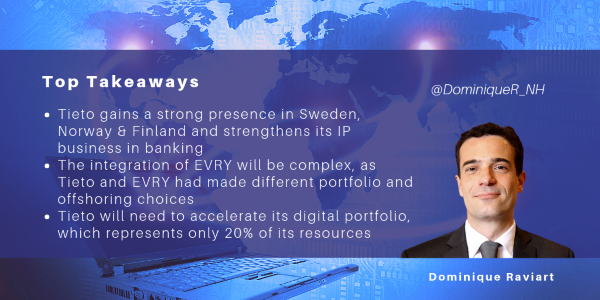Search posts by keywords:
Filter posts by author:
Related Reports
Related NEAT Reports
Other blog posts
posted on Jul 17, 2019 by Dominique Raviart

Tieto recently announced its intention to acquire EVRY. The company is offering 0.12 Tieto share and NOK 5.28 in cash per EVRY share. EVRY shareholders will receive €0.2bn in cash and 37.5% of Tieto’s capital, valuing EVRY to ~€1.4bn ($1.6bn). Also, Tieto is taking over the net debt of EVRY (NOK 6bn/$0.7bn).
The acquisition will give birth to the largest Nordics-headquartered IT services vendor, with ~24k employees and pro forma 2018 revenues of €2.9bn, and an adjusted EBIT margin of 11.1%.
Tieto and EVRY management have highlighted how complementary they are: EVRY has its background in Norway and has very little presence in Finland (~100 personnel), where Tieto has its headquarters; Tieto is little-present in Norway (10% of its revenues).
Where the acquisition will be making an impact is in Sweden, Nordics' largest IT services market. TietoEVRY will derive €1bn revenues from Sweden, which will be its largest geography, slightly ahead of Norway (€0.95bn) and Finland (€0.7bn) (all NelsonHall estimates).
Tieto and EVRY have focused for years on consolidating the Nordics IT services market, aiming to gain scale in their domestic market, and with IT giants such as IBM, Accenture, and CSC as key competitors. The Nordics IT services market has almost completed its consolidation, largely thanks to Tieto and EVRY, but also to CGI/Logica (WM-data) and NEC (KMD).
The competitive landscape has changed in the Nordics, with Indian service providers such as TCS and HCL Tech having become key competitors, and with increasing presence from Infosys and Wipro.
Tieto and EVRY have made different choices
Tieto and EVRY have very different profiles. Tieto has a service line-based structure, while EVRY has a geographical approach (Norway and Sweden) co-existing with its Financial Services solutions business. EVRY has very much focused on onshore delivery, while Tieto was embracing offshore and nearshore. Approximately 50% of Tieto’s headcount is now in its global delivery network, compared with 30% for EVRY, in India, Ukraine, Poland, and Latvia. The potential for further offshoring at EVRY is, therefore, very significant.
There have also been differences in strategy with regard to the two companies’ management of their IT infrastructure: whereas Tieto decided to keep its data center services business, standardize its offerings and focus on private cloud, EVRY outsourced all its infrastructure management to IBM SoftLayer in 2015, in a ten-year deal worth $1bn. Over the past three years, EVRY has migrated 5k servers and 3k network equipment to IBM SoftLayer’s data center in Oslo and now sells standard services across datacenter and workspace services.
Tieto and EVRY both have a solutions business. Tieto’s Industry Solutions software product business, which caters to multiple sectors (including payment, utilities, healthcare & welfare, hydrocarbon management and pulp & paper) accounts for 30% of revenues. EVRY has focused on the Financial Services sector, on open banking, cards, and ATM services.
Tieto and EVRY are, therefore, significantly different businesses. However, with digital, the two companies have announced strategy changes (with, at its core, digital services) and geographical convergence.
During its Q1 2019 earnings, Tieto unveiled its new strategic plan. The plan combines cost savings (€30m) and shifting from its service line structure to become more geography-centric. Tieto wants to provide more power to the geos and accelerate the shift to digital services in each country, with a focus on UX, analytics, and AI.
EVRY, as part of its strategy unveiled in late 2018, wants to become more centralized. The company has restructured its consulting and SI business in Norway around digital experience and business consulting, AI & analytics, business platforms, and ADM, security, and cloud. The company is rolling out the new structure in Sweden.
With their software products businesses:
- Tieto is rejuvenating its Industry Solutions unit, which has not been in growth mode for some years, to focus on financial services, public sector, and industrial sector, targeting R&D synergies, architectures, and program management synergies
- EVRY continues to focus on financial services. However, the company wants to verticalize more offerings, targeting initially public & health and SMEs. It is looking at providing personnel with industry skills, such as nurses and doctors in the healthcare sector. EVRY also targets solutions by supplying bundled services. We think that Tieto, with the broad portfolio of the Industry Solutions unit, especially in lifecare and welfare, local government, and case management, will help here.
A complex integration
The integration by Tieto of EVRY will be complicated, mainly because the two companies have made materially different choices in their operations in terms of structure, offshoring, and IT infrastructure. For this reason, the integration will take time.
Also, Tieto and EVRY need to transform the Swedish operations where EVRY has struggled for the past two years, with several contract losses, high attrition, recruitment difficulties, and reliance on subcontractors.
Increasing emphasis on digital offerings
TietoEVRY will focus on digital, security, and cloud as its growth engines. The company will have 5k digital personnel, representing ~20% of the total headcount, and will need to accelerate its portfolio transformation towards digital and towards consulting, leveraging its onshore background.
NelsonHall also expects TietoEVRY to accelerate its offshore movement in its Application Services units. This move is a must if TietoEVRY wants to effectively compete against Indian vendors and accelerate its growth.
Will TietoEVRY now expand its presence outside of Nordics? In the short term this is not likely, apart from its products business and its E&RD services – the company still needs to grow in Denmark, where NNIT, Norvo Nordisk’s former captive, operates.
